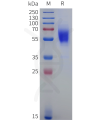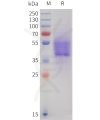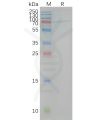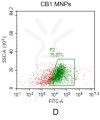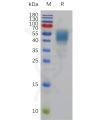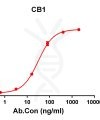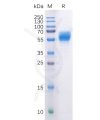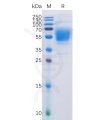CB1/CNR1 recombinant proteins and antibodies
The cannabinoid receptor type 1 (CB1), also known as CANN6 and CNR1, is a G protein–coupled receptor (GPCR) and a key component of the endocannabinoid system (ECS). It is abundantly expressed in the central nervous system, particularly in the cerebral cortex, hippocampus, basal ganglia, and cerebellum, while lower expression levels are found in peripheral tissues such as the liver, adipose tissue, and skeletal muscle. CB1 receptors interact with endogenous ligands such as anandamide (AEA) and 2-arachidonoylglycerol (2-AG) to regulate neurotransmitter release, thereby influencing pain perception, appetite, mood, learning, and metabolic homeostasis.
CB1-targeted drug research began in the 1990s, initially focusing on obesity and metabolic disorders. A CB1 receptor antagonist developed by Sanofi, was approved in 2006 for weight loss but was withdrawn in 2008 due to psychiatric adverse effects such as depression. Subsequently, research shifted toward peripherally restricted CB1 antagonists and biased modulators to minimize central side effects. In recent years, CB1 has regained attention as a therapeutic target in nonalcoholic steatohepatitis (NASH), fibrosis, neurodegenerative diseases, and pain management.
Globally, companies such as Pfizer, Bayer, Inversago Pharma, and Corbus Pharmaceuticals are actively developing CB1 modulators. Inversago’s INV-202, a peripherally restricted CB1 antagonist, has advanced to phase II clinical trials for NASH and obesity-related metabolic disorders. In China, biotech firms including BeiGene and WuXi AppTec are exploring CB receptor modulators and structure-based optimization strategies. In summary, CB1 is a pivotal regulator connecting the nervous and metabolic systems. The transition from centrally acting antagonists to peripherally selective modulators marks a new era for CB1-targeted therapies, with promising potential in metabolic, hepatic, and pain-related diseases.
To assist in the development of CB1 targeted drugs, DIMA BIOTECH can now provide a full range of products and services for CB1 targets. Products include ECD recombinant proteins, the full-length membrane protein, reference antibodies, and flow-cytometry-verified anti-CB1 monoclonal antibodies; services include customized services for antibodies against multiple genus proteins, antibody humanization, and affinity maturation services. In addition, to accelerate the development of CB1 biotherapy, DIMA BIOTECH has also prepared a CB1 single B cell seed library, from which lead antibody molecules can be obtained in as fast as 28 days; at the same time, we have currently screened out multiple CB1 lead molecules, and customers can get the molecules for functional evaluation and verification the next day.
ECD Proteins
SKU: PME100507B Target: CB1 Tag: C-Human Fc Avi tag
Price:10μg $79.00; 50μg $301.00 ; 100 μg $452.00
ECD Proteins
SKU: PME101747 Target: CB1 Tag: C-Mouse Fc tag
Price:10μg $100.00 ; 50μg $358.00 ; 100μg $528.00
Full Length Transmembrane Proteins
SKU: FLP100023 Target: CB1 Tag: C-Flag Tag
Price: 10 μg $900.00 ; 50 μg $4400.00 ; 100 μg $8000.00
Full Length Transmembrane Proteins
SKU: FLP100009 Target: CB1 Tag: C-Flag Tag
Price: 50 μg $1200.00 ; 100 μg $1600.00
ECD Proteins
SKU: PME-M100055 Target: CB1 Tag: C-Human Fc Tag
Price: 10μg $103.00 ; 50μg $388.00 ; 100 μg $568.00
Monoclonal antibodies
SKU: DME100144 Target: CB1
Application: ELISA; Flow Cyt
Price: 10μg $99.00 ; 100 μg $446.00 ; 500 μg $1340.00
ECD Proteins
SKU: PME100508 Target: CB1 Tag: C-Human Fc Tag
Price: 10μg $78.00; 50μg $310.00 ; 100 μg $460.00
ECD Proteins
SKU: PME100507 Target: CB1 Tag: C-Human Fc Tag
Price: 10μg $72.00; 50μg $274.00 ; 100 μg $411.00
Monoclonal antibodies
SKU: DME100144P Target: CB1
Application: Flow Cyt
Price: 100 test $550.00
Full Length Transmembrane Proteins
SKU: FLP120023 Target: CB1 Tag: C-Flag&Strep Tag
Price: 10 μg $810.00 ; 50 μg $3960.00 ; 100 μg $7200.00
Monoclonal antibodies
SKU: DME100144B Target: CB1
Application: ELISA; Flow Cyt
Price: 10μg $139.00 ; 100 μg $670.00 ; 500 μg $1999.00

